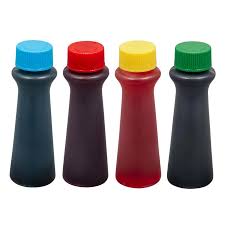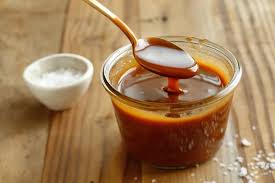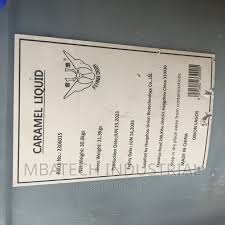![]()
If you’ve landed on this article page, you’re probably searching for a
good business idea—an idea that’s light on the pocket but heavy on
returns, promising both a fulfilling journey and potential profit.
|
How To Start A Lucrative Caramel Coloring Production and Supply
Business In Nigeria
Caramel coloring, scientifically known as caramel, is a food
coloring agent produced by heating carbohydrates, typically
sugar, to create a brown color and characteristic flavor. It is
widely used in the food and beverage industry to enhance the
appearance and appeal of various products, including
confectionery, beverages, baked goods, and sauces.
It is used by soft drinks companies, pharmaceutical companies
and bakeries as flavoring in puddings and desserts, as filling
in bonbons and as a topping for ice cream and custard.
Statistics show that the global caramel coloring market is
experiencing steady growth, driven by the increasing consumer
preference for natural and clean label ingredients in food and
beverages. According to a report by Market Research Future, the
global caramel coloring market is projected to reach a value of
over USD 2 billion by 2027, with a compound annual growth rate
(CAGR) of approximately 6.5% during the forecast period.
In Nigeria and Africa, the food and beverage industry is
witnessing rapid growth, fueled by population growth,
urbanization, and changing consumer preferences. The local
demand for caramel coloring is rising as food manufacturers
strive to develop visually appealing and appetizing products.
Additionally, the expansion of the food processing sector and
the emergence of new product categories in the region contribute
to the increased need for caramel coloring.
The setup period of the business depends on factors such as
production scale, market demand, and operational efficiency. It
may take several months to establish the production process,
secure reliable suppliers, and build a customer base. As the
business matures, it can expand its product range, optimize
production techniques, and explore new market opportunities.
The production yield of caramel coloring can vary depending on
the specific recipe and production methods employed. It is
essential to ensure consistent quality and color intensity while
maximizing the yield to meet customer demands and achieve
profitability.
In Nigeria and Africa, the Caramel Coloring Production and
Supply Business presents significant opportunities due to the
growing food and beverage industry, increased consumer
preference for visually appealing products, and the rising
demand for natural and safe food coloring alternatives. By
catering to the local market and exploring export opportunities,
the business can capitalize on the region’s market potential.
Types Of Caramel Coloring Production and Supply Businesses In
Nigeria and Africa
Caramel Coloring Manufacturing Plant: This type of business
involves establishing a dedicated manufacturing plant that
produces caramel coloring on a large scale. It requires setting
up infrastructure for the processing, heating, and
caramelization of sugars to produce different types and shades
of caramel coloring.
Caramel Coloring Extraction: This type of business focuses on
extracting caramel coloring from natural sources such as sugar
cane or other sugar-rich plants. It involves extracting and
processing the caramelized compounds to obtain pure caramel
coloring for supply to various industries.
Caramel Coloring Blending and Customization: This business
specializes in blending different types and shades of caramel
coloring to meet specific customer requirements. It offers
customization services by adjusting color intensity, hue, and
other characteristics based on client preferences.
Caramel Coloring Packaging and Distribution: This business
focuses on packaging caramel coloring into various forms such as
liquid, powder, or concentrated paste, and distributing it to
food manufacturers, beverage companies, and other industries.
Caramel Coloring Retail: This type of business involves
retailing packaged caramel coloring products directly to
consumers, culinary professionals, and small-scale food
producers. It can include physical stores or an online platform
for sales.
Caramel Coloring Export: This business focuses on exporting
caramel coloring products to international markets. It involves
complying with export regulations, establishing distribution
networks, and meeting the quality standards of target countries.
Caramel Coloring Consulting Services: This type of business
provides consulting and advisory services to clients in the food
and beverage industry regarding the selection, usage, and
incorporation of caramel coloring in their products. It offers
expertise on color matching, regulatory compliance, and
formulation guidance.
Caramel Coloring Research and Development: This business focuses
on research and development activities related to caramel
coloring, including the development of new production methods,
improvement of color stability, and exploration of innovative
applications in various industries.
Caramel Coloring Quality Control and Testing: This business
specializes in providing quality control and testing services
for caramel coloring products. It ensures that the produced
coloring meets industry standards, regulatory requirements, and
customer specifications.
Caramel Coloring Ingredient Supply: This business involves
sourcing and supplying raw materials and ingredients used in
caramel coloring production, such as sugars, sugar cane
extracts, and other additives required in the manufacturing
process.
Caramel Coloring Equipment Supply: This type of business focuses
on supplying equipment and machinery needed for caramel coloring
production, such as heating systems, processing units, blending
machines, and packaging equipment.
Caramel Coloring Certification and Compliance Services: This
business offers services related to obtaining certifications and
ensuring compliance with food safety and quality standards for
caramel coloring production. It assists companies in meeting
regulatory requirements and obtaining necessary certifications.
Caramel Coloring Waste Management: This business focuses on
developing sustainable waste management solutions for caramel
coloring production, such as the utilization of by-products and
minimizing environmental impact through proper disposal and
recycling methods.
Caramel Coloring Marketing and Branding: This business
specializes in marketing caramel coloring products, creating
brand awareness, and developing marketing strategies to reach
potential customers. It includes activities such as advertising,
digital marketing, trade shows, and brand positioning.
Caramel Coloring Training and Education: This business provides
training and educational programs related to caramel coloring
production, usage, and application. It targets professionals in
the food industry, culinary schools, and aspiring entrepreneurs
looking to enter the caramel coloring business.
It is worth noting that specific data on the peak production,
supply, and demand season for caramel coloring in Nigeria and
Africa may vary based on market research and industry trends. It
is advisable to consult market reports, industry experts, and
local suppliers to obtain precise information on the seasonality
of caramel coloring in the region.
How To Produce Caramel Coloring In Nigeria or Africa
Ingredient Preparation: Gather the necessary ingredients, which
typically include sugar and water. Ensure that the sugar is of
good quality and free from impurities.
Sugar Dissolution: In a clean and heat-resistant container,
combine the sugar and water in the desired ratio. The ratio will
depend on the desired color intensity and consistency of the
caramel coloring.
Heat Application: Place the container with the sugar-water
mixture on a heat source, such as a stovetop or a specialized
caramelization apparatus. Gradually increase the heat to
medium-high.
Heating and Caramelization: Allow the mixture to heat and reach
a rolling boil. The water will start to evaporate, and the sugar
will begin to caramelize. Stir the mixture occasionally to
ensure even heating and prevent burning.
Color Development: Continue heating until the desired color is
achieved. The longer the mixture is heated, the darker the
caramel coloring will become. Monitor the color closely to
prevent over-caramelization.
Cooling and Storage: Once the desired color is attained, remove
the mixture from the heat source and let it cool. Transfer the
caramel coloring to clean and sterilized containers for storage.
Ensure proper labeling and dating.
Quality Control: Perform quality checks to ensure the caramel
coloring meets the desired standards in terms of color
intensity, flavor, and consistency. This may involve sensory
evaluation and laboratory analysis.
Packaging and Supply: Package the caramel coloring in suitable
containers for distribution and supply. Consider using
food-grade packaging materials that preserve the quality and
shelf life of the product.
Compliance and Regulations: Familiarize yourself with local
regulations and standards regarding the production and supply of
caramel coloring. Ensure that your business operations comply
with applicable laws and regulations.
Remember to maintain a clean and sanitary production environment
throughout the process to ensure the safety and quality of the
caramel coloring.
Types Of Equipment & Tools Used In The Caramel Coloring
Production and Supply Business In Nigeria or Africa
Stainless Steel Mixing Vessels: Used for dissolving and mixing
the sugar and water to create the caramel mixture.
Heat Source: Can be a gas stove, electric stove, or specialized
caramelization apparatus to provide the necessary heat for
caramelization.
Stainless Steel Cooking Pots: Used for heating the sugar-water
mixture and caramelizing the sugar.
Thermometer: Helps monitor and control the temperature during
the caramelization process.
Stirring Utensils: Such as wooden spoons or stainless steel
spatulas, used to stir the mixture and ensure even heating.
Measuring Instruments: Like measuring cups and scales, used to
accurately measure the ingredients.
Cooling Racks: Used to cool the caramel mixture after
caramelization.
Containers: Clean and sterilized containers for storing the
finished caramel coloring.
Labels and Stickers: Used to label the containers with product
information, batch numbers, and expiration dates.
Sealing Equipment: Including lids, caps, or seals for airtight
packaging of the caramel coloring.
Weighing Scales: Used to weigh the finished caramel coloring
before packaging.
Packaging Materials: Such as bottles, jars, or pouches suitable
for food-grade packaging.
Heat Sealer: For sealing packaging materials to ensure product
freshness and prevent leakage.
Labeling Machine: Automates the process of applying labels to
containers, improving efficiency and accuracy.
Storage Facilities: Proper storage areas to maintain the quality
and shelf life of the caramel coloring, such as cool, dry, and
well-ventilated spaces.
It’s important to select equipment that meets food safety
standards and regulations to ensure the quality and safety of
the caramel coloring.
The Caramel Coloring Production and Supply in Nigeria and Africa
presents significant opportunities for business growth and
market expansion. The food and beverage industry in Nigeria and
Africa is witnessing continuous growth, creating a demand for
high-quality caramel coloring products. Despite the challenges
such as sourcing raw materials, infrastructure limitations, and
competition, the market potential for caramel coloring remains
promising.
By adopting strategic marketing approaches, establishing a
strong distribution network, and investing in research and
development, businesses can overcome these challenges and
position themselves as key players in the industry. It is
essential to maintain a focus on product quality, adhere to
regulatory standards, and stay updated with technological
advancements.
Furthermore, the increasing consumer awareness of natural and
clean-label products presents an opportunity to develop
innovative caramel coloring solutions that cater to these
preferences. Expanding into international markets can also be
explored to diversify revenue streams.
Overall, with careful planning, industry knowledge, and a
customer-centric approach, Caramel Coloring Production and
Supply businesses in Nigeria and Africa can thrive and
contribute to the growth of the food and beverage industry in
the region.
Get our Practical Guide on How to start Caramel Production
business in Nigeria. This comprehensive guide will walk you
through the fundamentals of starting and running a successful
Caramel Production Business in Nigeria, from initial
planning to profitability. We’ll cover key factors like
identifying in-demand niches, establishing a strong brand,
marketing effectively, optimizing operations and delivering an
exceptional student experience.
|







